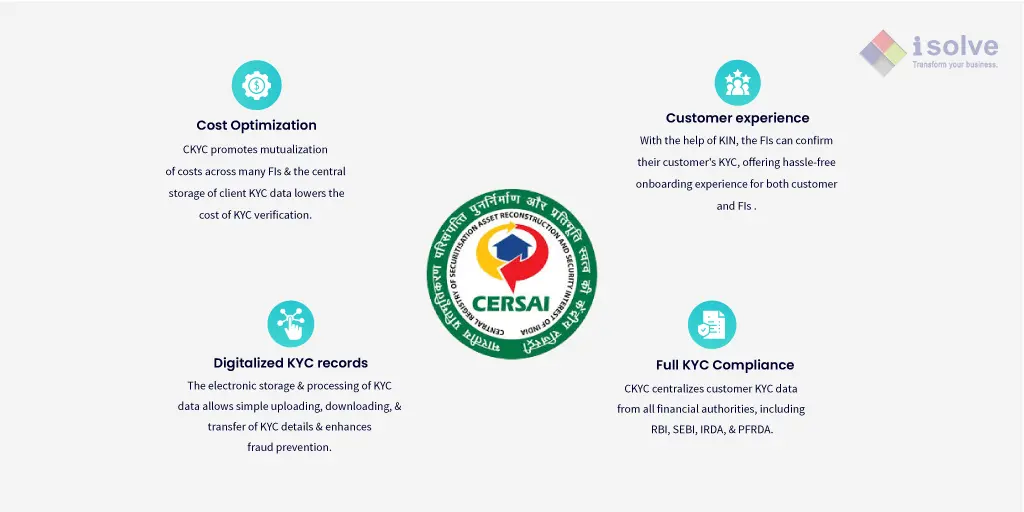A Central KYC System to Offer One-time Customer Verification
Authored by: Mohammed Mansoor Reading Time: 02 min 17 sec
Authored by: Mohammed Mansoor Reading Time: 02 min 17 sec
Financial services face several challenges in managing multiple-KYC utilities, which has become a tedious process to verify customers manually. RBI introduced the Central Registry of Securitization Asset Reconstruction and Security Interest of India (CERSAI) to centralize and digitize customer KYC documents. The primary goal of CERSAI CKYC is to reduce repeated KYC verification.
This blog talks about iFlow CKYC Platform capability to digitize KYC records and enable a single window interface for Banks and NBFCs to perform one-time KYC verification with CERSAI CKYCR API Integration.
If you missed our previous blogs about Digital Customer Onboarding and KYC Verification, click: https://isolve.in/blog/ to know more about it.
Central KYC is the procedure of centrally storing the customer’s KYC information.
The Indian Ministry of Finance issued CKYC as a directive, which became operational in 2016 after being initially stated in the Union Budget of 2012–2013. It is controlled and administered by the Central Registry of Securitization & Asset Reconstruction and Securities Interest in India (CERSAI).
The customer can utilize the 14-digit KIN to complete KYC with any other bank, insurance, NBFC, or securities intermediary without resubmitting their KYC documentation. FIs can use the KIN to verify the KYC of a customer registered with CERSAI.

The platform enables the inter-usability of KYC records amongst CERSAI-registered financial institutions. As a result, the FIs eliminate the time and effort of verifying the customer again.
Since CKYC promotes mutualization of costs across many FIs, the central storage of client KYC data lowers the cost of KYC verification.
With the help of the KYC number, the FIs confirm their customer’s KYC. As a result, both the customer and the financial institution experience hassle-free onboarding.
CKYC centralizes customer KYC data from all financial authorities, including RBI, SEBI, IRDA, and PFRDA.
CKYC is an ideal solution introduced by the Indian government to lessen the hassle for FIs to verify their customers’ identities. Also, it improves the overall security, stability, accessibility, and processing of new and existing customers.
iFlow CKYC is a reliable solution that assists financial institutions and NBFCs adhere to the government effort to unify the KYC process for all financial institutions under a single window. It also aids in the prevention of money laundering and other illegal financial practices with deduping and checker functionalities. It offers a verification process that is safer and more effective, compatible with current onboarding practices.
+91 93634 99313 | +91 89398 11425 | +91 93634 99328
competence_building@isolve.co.in | talentsourcing@isolve.co.in
+91 99940 56227 | +91 78258 78258
business@isolve.global
Middle East
A4 - 105A, Building No. A4
Al Hamra Industrial Zone-FZ
RAK, United Arab Emirates
M: +91 - 78240 78240
Netherlands
Strawinskylaan 3051, 1077ZX, Amsterdam,
The Netherlands.
M: +31 6495 62630
Norway
C. J. Hambros plass 2c,
0164 Oslo,
Norway.
M: +47 92 96 06 81
